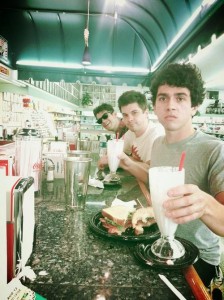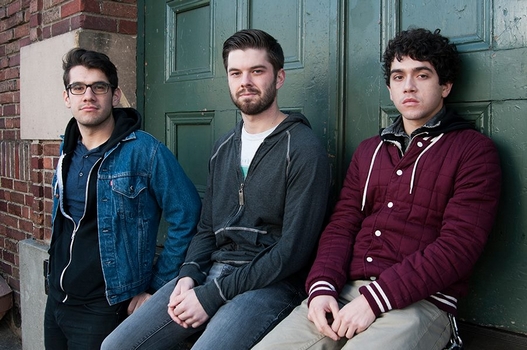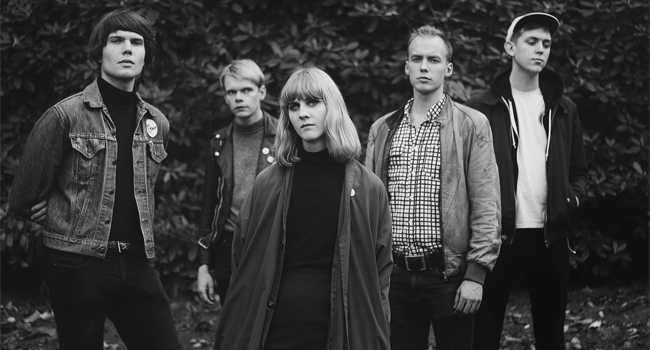From his room in Elk Grove, Calif., The Speed of Sound in Seawater’s lead vocalist and guitarist, Damien Verrett, greeting via Skype is with a voice lower than one would expect from the young man typically heard singing in a soft, high range. What isn’t surprising, is to see his room displaying a masquerade-like mask and several books, considering the band’s alternative style and literature-based songs.
The Speed of Sound’s light-hearted music sometimes contrasts with the darker connotations of the lyrics, but always works out perfectly to make fun, impressive songs.
“’The Oddest Sea’ was very heavily inspired by H.P. Lovecraft,” Verrett says of one of the singles on the band’s debut album, First Contact. “He has all these stories of explorers coming across these horrible ancient cities… [and] he always uses these terms about how the geometry of all the buildings is subtly off and there’s just this unease to the places that these explorers stumble upon, and I liked that idea of a vague, unspoken nemesis in the air.”
Most of the band’s lyrics are stories that seem to put listeners directly in the center of a science-fiction book. “Dinner and a Movie,” a fan favorite from the trio’s early EPs, was inspired by Cormac McCarthy’s The Road; the title of “To Kelly Lee” comes from another Lovecraft story involving the one and only Cthulhu; and then, of course, there’s “The Oddest Sea.”
The title First Contact is not only fitting of Speed of Sound’s first full-length album, or first real “contact” with the world; it also gives a hint of the unique content inside.
“[We called it First Contact] because, one: it’s our first album, and then two: it kind of has this paranormal connotation to it, like first contact with aliens or ghosts, and so many of the songs on the album have to do with the paranormal. It was just a good fit,” Verrett says.
Perhaps the most obvious nod to the paranormal is on the track “Apples to Apples Dust to Dust.”
“To me, that song is about some younger kids getting ready for a sleep over and instead of playing something like Apples to Apples or some innocent board game, they summon the devil or some demon through their Ouija Board,” Verrett says.
While many of the songs are inspired by literature, a lot, such as “Apples to Apples,” are fictional stories based off of the band’s interests.
“For a while, I was pretty convinced that ghosts were real,” Verrett says. “Right now, I’m kind of on the fence. Ghosts are interesting to me, because it suggests this concept of something immeasurable existing in your being, like a soul or spirit. It’s not scientific in any way, and the idea that it can linger on after a person dies is really interesting to me. I think the Ouija Board aspect is much more fallible, though.”
2013’s First Contact shows some of The Speed of Sound in Seawater’s interesting, alternative math rock style, but takes a step back from the hectic instrumentation of the group’s first EPs to focus on song writing that is structurally sound.
“Some of that older stuff–the parts are a little more off the handle, wild two-hand tapping over pretty nonsensical drumming,” Verrett says. “It works only because it’s all so hectic that the listener doesn’t really have time to think, ‘Is this as musically coherent  as it could be?’ I guess the objective this time was ‘less is more.’ Every part should be doing its job, not, ‘Okay, you play this over me doing this.’”
as it could be?’ I guess the objective this time was ‘less is more.’ Every part should be doing its job, not, ‘Okay, you play this over me doing this.’”
That isn’t to say that The Speed of Sound in Seawater is less impressive as an act now, or that Verrett completely abandoned the finger tapping style, which is still used a little in “Apples to Apples” and “Soulmate 2.1.” The Speed of Sound remains one of the most interesting new bands around and has perfected its style into a combination of math rock and indie-pop that is both accessible and impressive.
“When we play the new songs live it feels much more in control,” Verrett says. “A lot of that older stuff–by the time we were touring I really, really regretted writing certain guitar parts the way I did, because I had to sing over them… It’s more important that I can sing the parts than pretend to be Eddie Van Halen.”
Whether or not the members of The Speed of Sound in Seawater are shredding on their instruments or simply accenting each other perfectly, they have consistently created astounding material. The indie scene awaits the band’s next release with open arms.



